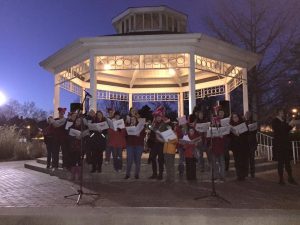Appropriation: Thoughts on world musics
- Marlene
- Blog, choir, Uncategorized
- No Comments
Appropriation: Thoughts on world musics
Unless you are a composer, every musician is guilty of appropriation.
It’s the nature of our art: we take someone else’s music and make it our own. Indeed, the act of appropriation, and how well we absorb and interpret the music, is what makes a musician successful.
As a choir director, cultural appropriation (and by extension, misappropriation) is something I am always considering. It’s something I think about as a flutist, too, but it seems a more pressing issue in vocal music because of the added responsibility of interpreting words.
Two recent examples come to mind:
- As part of our celebration and reflection of Martin Luther King, Jr.’s legacy, my choir sang “Lift Every Voice and Sing.” This song is well-known as the unofficial national anthem of African Americans. “Lift Every Voice and Sing” became popular during the Civil Rights marches of the 1960s and continues to have resonance today. Would it be OK for a predominantly white choir to sing this anthem during a worship service about the Civil Rights Movement?
- Vocal Resistance, a social justice choir, wants to add a new song to the repertoire. Members are engaged in a robust debate about what songs we are “allowed” to sing. Under consideration were “We Shall Overcome,” closely associated with the Civil Rights Movement, and “Ain’t Gonna Let Nobody Turn Me Around,” an African American gospel song. What are the implications for a social justice choir (with little cultural diversity) when performing songs from other movements and strongly associated with African-American culture?
For me, there are three tests for musical misappropriation.
1. Respect context and intention.
It is our duty to perform a bit of research into the song’s roots. Who is the composer? Why was it written? When was the song first performed? What do the words mean? How has the song been used historically? If words are going to be changed, they must respect the composer’s intention. For instance, I have heard several groups add a verse of “gay and straight together” to “We Shall Overcome.” This seems appropriate for today’s struggles.
2. Perform with integrity.
If we can’t sing the song well, we aren’t performing it. Period.
3. Respect copyright, paying the composer whenever possible.
For songs not in the public domain, the choir is obligated to pay the composer and arranger. This means buying sheet music for all singers or buying the rights from the composer. Some composers have asked our choir to please make sure they are given credit in any social media mention or video.
If the choir is able to satisfy all three requirements, I feel confident programming it.
All musicians must be sensitive to appropriation in music. However, we can’t let the fear of cultural misappropriation prevent us from sharing great music. In order for music to be alive, it must be performed. If our choirs want to be truly inclusive, we have to sing music that is representative of everyone, not simply a reflection of the cultural heritage of the members currently in the group.
Here are some writings by others on the subject:
A Perspective on Music and Cultural Misappropriation
Cultural Appropriation in Pop Music- When Are Artists In the Wrong?
11 Songs Prove the History of Music Is All About Cultural Appropriation
What are your thoughts?

No comments.